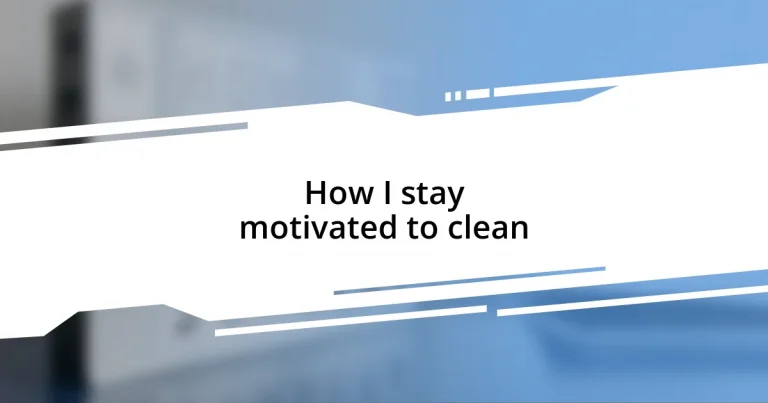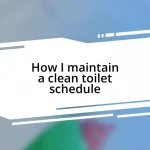Key takeaways:
- Understanding personal motivation can transform cleaning from a chore to a rewarding act of self-care, enhancing creativity and a sense of accomplishment.
- Setting realistic cleaning goals by breaking tasks into manageable parts helps maintain motivation and makes the process more enjoyable.
- Creating a flexible cleaning schedule allows for adaptability while ensuring cleanliness and reducing stress levels.
- Incorporating rewards and involving others in cleaning tasks can make the experience more engaging and fun, fostering connections and accountability.

Understanding personal motivation
Personal motivation can vary greatly from person to person, and I’ve found that understanding my own triggers has made all the difference. For instance, I’ve noticed that when my living space feels cluttered, I become anxious, almost restless. It’s as if my surroundings reflect my mental state, and this nudges me to clean. Have you ever felt that way?
I remember a time when I was overwhelmed by a particularly messy apartment after a busy week. Instead of viewing cleaning as a chore, I reframed it as a form of self-care. That shift in perspective helped me see the act of tidying up as a way to regain control and find peace. This emotional connection transformed my motivation—it wasn’t just about eliminating mess, but about creating a sanctuary.
Reflecting on your personal motivations is crucial. What drives you? For me, it’s the combination of a clean environment sparking creativity and the sense of accomplishment that follows. When I clean, it feels less like a task and more like a rewarding journey. Understanding this dynamic has been key for me, and I encourage you to explore what ignites your motivation!
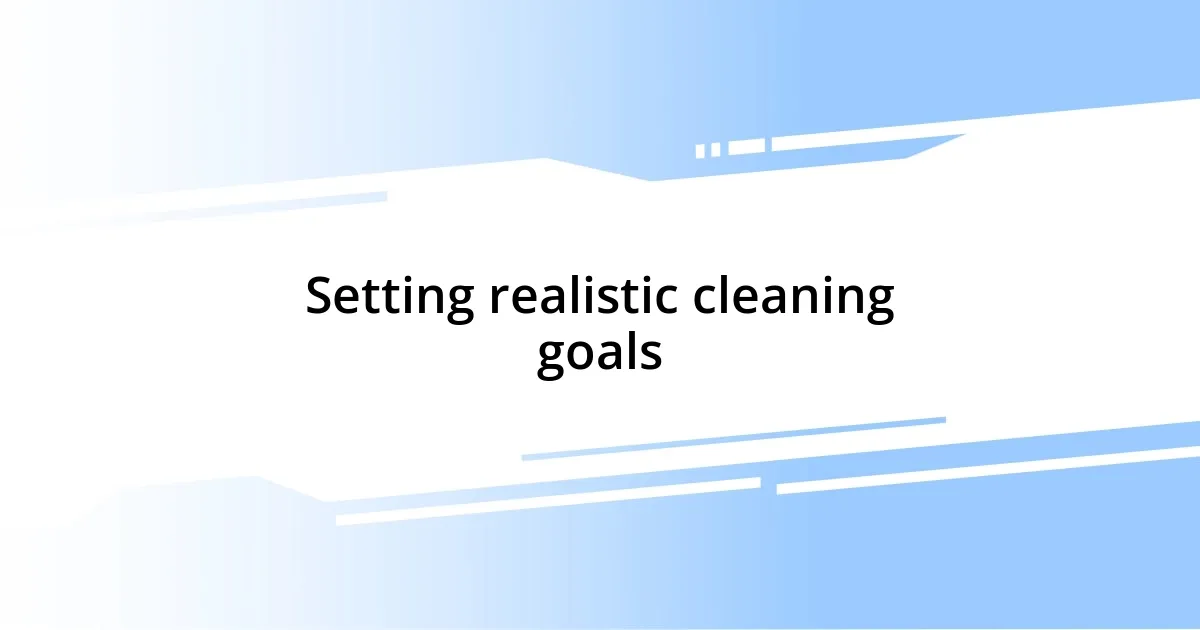
Setting realistic cleaning goals
Setting realistic cleaning goals is vital for maintaining motivation. I often find myself mapping out what I genuinely can accomplish in a given time frame. For instance, when I focus on a single room rather than tackling the entire house, it feels more manageable. I remember a Saturday when I told myself I’d clean the whole house in five hours. I ended up frustrated and exhausted. Now, I break it down, and the satisfaction of completing just one area keeps my spirits high.
Here are some strategies I use for setting those goals:
- Define specific tasks: Instead of saying “clean the kitchen,” I’ll specify “wipe down countertops and clean the microwave.”
- Time yourself: I often set a timer for 20 minutes. It makes cleaning feel like a sprint rather than a marathon.
- Align with energy levels: I choose tougher tasks during times when I feel most energized, saving lighter chores for when I’m a bit more tired.
- Prioritize areas: I focus on high-traffic or clutter-prone areas first, which quickly creates a sense of order and accomplishment.
By setting goals that resonate with my energy and time, I’ve transformed cleaning from an overwhelming task into a series of rewarding achievements.
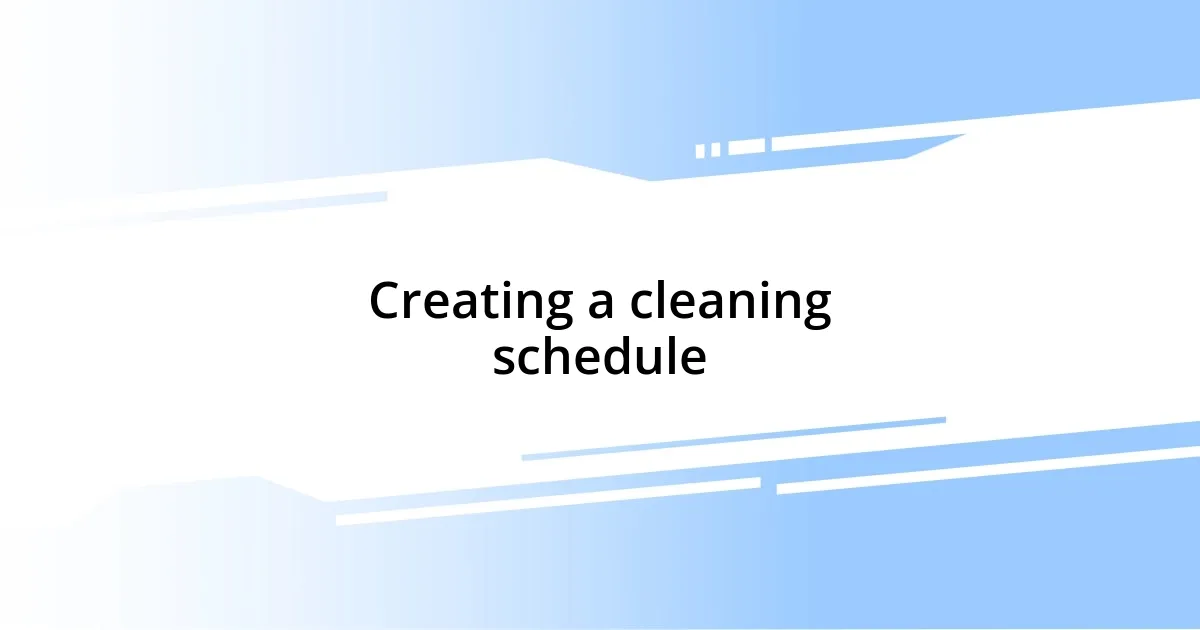
Creating a cleaning schedule
Creating a cleaning schedule has been a game changer for me. Initially, I felt lost in the chaos of laundry, dishes, and dusting. One day, I decided to sit down and map out my week. I divided tasks by days—Wednesdays for kitchen deep cleaning, Saturdays for vacuuming and mopping. This simple act of structuring my cleaning gave me clarity and direction. Have you tried using a schedule?
Remember that life can be unpredictable. I’ve learned to be flexible with my cleaning schedule. If I have a busy week, I adjust my tasks to ensure I don’t fall behind. This adaptability not only keeps the space tidy but also helps me manage my stress levels. Recently, I was swamped with work assignments, so I prioritized quick 10-minute clean-ups instead of lengthy sessions. This approach might be something you could consider for maintaining balance in your life.
This is how my week generally looks:
| Day | Task |
|---|---|
| Monday | Dusting and surfaces |
| Tuesday | Laundry and ironing |
| Wednesday | Kitchen deep clean |
| Thursday | Bathroom touch-ups |
| Friday | Tidy living room |
| Saturday | Vacuuming and mopping |
| Sunday | Relax and enjoy a clean space! |
By creating and adhering to a structured yet flexible cleaning schedule, I’ve found that motivation comes naturally. It transforms cleaning from a daunting task into a consistent part of my routine, allowing me to enjoy my space fully and continuously. How would a structured schedule change your cleaning approach?
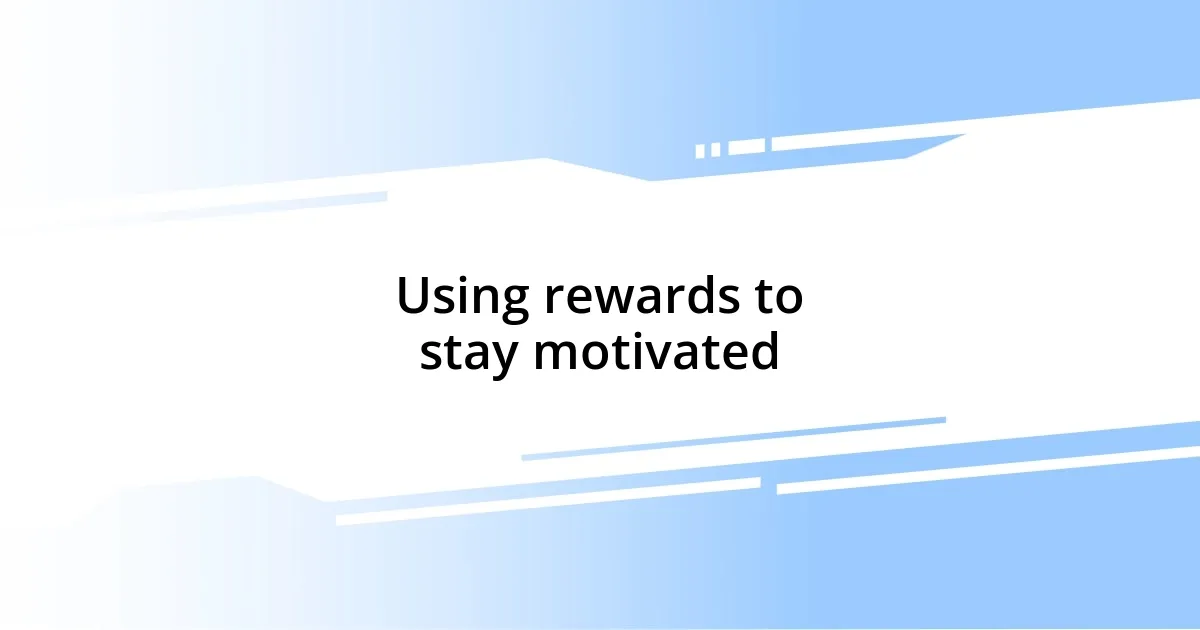
Using rewards to stay motivated
Using rewards has been a powerful motivator for me when it comes to cleaning. After tackling difficult tasks, I allow myself to indulge in something enjoyable, like a favorite dessert or a cozy Netflix episode. There’s something satisfying about linking a job well done with a little treat; it creates a positive association in my mind that makes the next cleaning session a bit more appealing. Have you tried pairing your chores with something you love?
I’ve also found that celebrating small victories can lift my spirits. For example, after freshening up my living room, I’ll take a moment to appreciate the effort before diving into the next task. Sometimes, I might even reward myself with a walk outside to enjoy the fresh air—it’s like a mini-celebration! That little break not only feels like a reward but also recharges my motivation, making me eager to keep going. How would it feel to take a moment for yourself after each completed task?
Incorporating rewards into my cleaning routine has turned what used to feel like a chore into a series of fun milestones. On one occasion, I set a goal to declutter my closet, and when I finished, I treated myself to a coffee date with a friend. Not only did I enjoy their company, but I felt an immense sense of accomplishment both from cleaning and spending quality time. Reflecting on moments like this reminds me that rewarding myself energizes my motivation, and it’s worth considering how rewards can transform your own cleaning experience. What rewards would resonate with you after a cleaning session?

Finding enjoyable cleaning techniques
Finding enjoyable cleaning techniques can significantly change the way I approach my chores. One method I’ve adopted is incorporating music or podcasts into my cleaning routine. I’ll curate a playlist full of my favorite upbeat songs and let the rhythm carry me through dusting or scrubbing. It’s fascinating how a good tune can turn mundane tasks into a mini dance party. Have you ever noticed how music can lift your spirits while you clean?
Another technique that I absolutely love is transforming cleaning into a game. For instance, I might set a timer for 15 minutes and challenge myself to see how much I can accomplish before the buzzer goes off. I can feel my energy levels surge, almost like I’m racing against the clock! On one occasion, I managed to completely declutter my kitchen in under an hour by using this playful approach. It felt exhilarating, and it makes me wonder—what small challenges could you create for yourself to make cleaning more fun?
Lastly, I’ve discovered the charm of cleaning with a buddy. Inviting a friend over to tackle tasks together creates a social atmosphere that makes work feel lighter. We chat, share stories, and even motivate each other to finish faster. One rainy Saturday, my friend and I tackled an entire afternoon of cleaning while indulging in nostalgia with our favorite childhood songs. It turned out to be an enjoyable experience that reminded me cleaning doesn’t have to be solitary. How might your cleaning routine change if you added a friend into the mix?
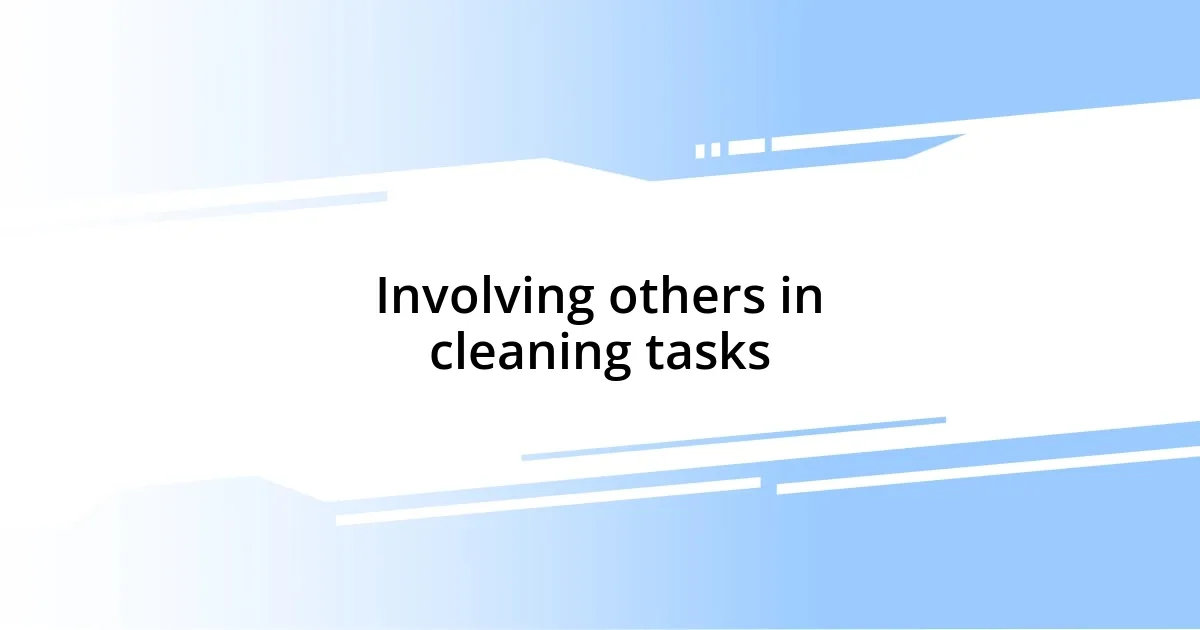
Involving others in cleaning tasks
Involving others in cleaning tasks can really shift my perspective on chores. I remember one weekend when my family and I decided to tackle our backyard together. We turned it into a fun mini-event, complete with music and snacks. The laughter and teamwork transformed what could have been a tedious task into a bonding experience. Have you ever considered how cleaning can become a collective effort?
Sometimes, enlisting a friend to help can spark unexpected motivation. I once invited a neighbor over to clean our garages, and we ended up sharing stories about our lives while sorting through years of clutter. It’s amazing how chatting made the tasks fly by, and by the end of the day, we both felt accomplished. There’s something uniquely uplifting about working alongside others that makes cleaning feel less like a chore and more like an opportunity to connect with someone.
Additionally, I’ve found that dividing tasks can keep things efficient and even foster a sense of friendly competition. When my siblings and I had a cleaning day, we created teams and kept track of who finished their chores fastest. Not only did this inject a playful spirit into the process, but it also made us all more accountable. How could you create a fun competition with your friends or family during cleaning?

Reflecting on your progress
Reflecting on my progress is like giving myself a well-deserved pat on the back. I often take a moment to pause and admire the freshly cleaned spaces. It’s rewarding to see how much effort I’ve put in. Sometimes, I even take before-and-after photos to capture the transformation. Have you ever noticed how satisfying it can be to document your achievements?
When I think about the little victories, like finally decluttering the closet or scrubbing the kitchen floor, it fuels my motivation for future cleaning sessions. I remember a time when I spent an entire afternoon organizing my workspace. The difference was astonishing; it felt like I had gained a whole new room! This reflection not only boosts my confidence but also helps me identify areas needing attention next time. What breakthroughs have you experienced that inspire you to keep going?
I’ve learned that acknowledging progress can shift my mindset from viewing cleaning as a chore to seeing it as a form of self-care. After tackling a particularly messy area, I often sit down with a cup of tea and relish the freshness around me. It’s like a mini-celebration that reminds me of the peace created through my efforts. When was the last time you took a moment to appreciate your hard work? It’s in these reflections that I find my motivation to maintain the momentum.












